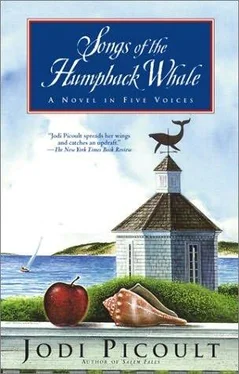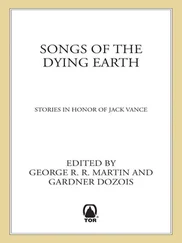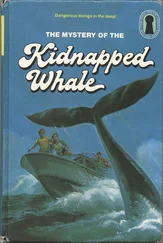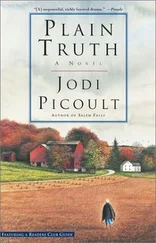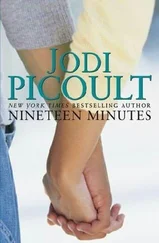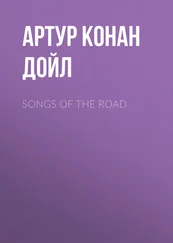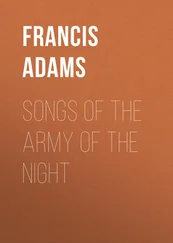Joley looks at me out of the corner of his eye. “Sure, Jane. Whatever you say.”
I find myself slouching down in the passenger seat and putting my feet up on the dashboard, the very thing I tell Rebecca not to do. We pull up to a stop light, and I can hear Hadley’s and Rebecca’s voices carrying. “Eighty-two bottles of beer on the wall,” they sing.
Joley glances at me. “I won’t bring it up anymore. But sooner or later-probably sooner-Oliver is going to show up at the orchard and demand an explanation. I’m not sure you’ve really got one, yet, either. And I’m positive you won’t know what to say when he orders you to get back in the car and go home with him.”
“I know exactly what I’m going to say,” I announce, to my own surprise. “I’m going to tell him no.”
Joley slams on the brakes and I hear the thump of two chairs against the back wall of the cab. Rebecca says, Ow. “You’ve got a little girl back there who doesn’t know what’s going on in your head. Do you think it’s fair to waltz her out of her home and then spring on her the surprise that she’s not going back? Or that she’s not going to live with her father? Have you asked her what she thinks about all this?”
“In not so many words,” I say. “What would you do?”
Joley looks at me. “That’s not the issue. I know what you should do. Don’t get me wrong: I love having you here, and I can be all selfish about that, but you don’t belong in Massachusetts now. You should be back in San Diego, sitting at your kitchen table with Oliver, talking about what went wrong.”
“My brother the romantic,” I say dryly.
“The pragmatist,” Joley corrects. “I think fifteen years is a lot of time to chalk up to a mistake.”
Hadley informs Joley he’s just missed the turn. Joley backs up into a dirt driveway and turns the truck around. “Promise me you’ll think about it. Even if good ol’ Oliver is standing on the porch when we get back, you won’t open your mouth until you hear what he has to say.”
“Hear what he has to say. Jesus, Joley, I’ve been doing that for a lifetime. When do I get to talk? When is it my turn?”
Joley smiles. “Let me tell you something I’ve learned from Sam.”
“Do you have to?”
“He’s a hell of a businessman. He’s not a man of many words, and just because of that he creates a presence for himself. He forces whomever he’s up against to do the speaking, to talk in circles. And the whole time he just sits there and listens. It gives the appearance of absolute knowledge, of total control. I mean, I know Sam pretty well, so I can see that sometimes he’s scared shitless. But that’s not the point. The point is, he knows how to turn that to his advantage. He waits, and he absorbs the whole situation, and he’s so quiet that when he does open his mouth, you can be damn sure the whole world is listening.”
I loll my head against the side of the seat belt. “Thank you for sharing that tidbit of advice with me.”
“Pretend it has nothing to do with Sam,” Joley says, grinning. “It’s valuable, in spite of what you think of him.”
Before I know it we are speeding across a gravel area, kicking up a storm of dust. BUTTRICK’S, the hand-painted sign reads. The building is shaped like a T. A line of girls in yellow checked dairy outfits are waiting, pen and pad in hand, to take orders. On the roof, above the sign, is a big plastic cow.
“You like the cow?” Hadley says to Rebecca, helping her out of the truck.
She nods. “I’ve never seen anything like it.”
Hadley leads her over to a split-rail fence, with an extra layer of barbed wire running above the top rail. It encloses a large grassy meadow dotted with Holsteins. It looks like they have been arranged by a photographer, really. “This place reminds me of New Hampshire,” Hadley says. “That’s where my mom lives now.”
He hops over the fence, which almost grabs the attention of the lazy cows. One actually turns its head. He holds his hand out to Rebecca and helps her climb over the barbed wire so that she is in the field too. “When are you going to be back?” I ask my brother.
“Dinnertime,” Joley says, “with all the traffic.”
Hadley takes Rebecca by the hand and leads her up to a placid cow. It is sitting, its knees folded up underneath. Rebecca, guided by Hadley’s hand, holds her fingers out to the cow, which starts to lick them. Rebecca laughs and steps back. “You get many of these in San Diego?” he asks.
Rebecca shakes her head. “What do you think?”
“They have four stomachs. I don’t know what they do with each one, though.”
“Four stomachs,” Rebecca says, awed. “Wow.”
Hadley takes a step back; you can tell he isn’t used to being revered as an expert on much of anything. “And you can’t keep them in the same field as sheep, because the sheep eat the grass too low and then the cows can’t wrap their tongues around it to rip it up.” He is visibly enjoying this. “They only have one set of teeth, the bottom.” For a girl who never cared about livestock, Rebecca is hanging on his every word.
“They have this ear language,” Hadley says, even more animated. “Two ears back is happy, two ears forward is mad. One forward and one back means, ‘What’s up?’” Hadley laughs. “If you lived here,” he says, dropping his voice a little, “if you lived here for real I’d get you a calf.” He holds Rebecca with his eyes for a few seconds, and then he turns away.
“I’d like that,” Rebecca says. “A calf. I’d call it Sparky.”
Hadley, who has been walking in a circle, stops in his tracks. “No kidding,” he says, his mouth dropping open. “I had a cow named Sparky as a kid.”
He stares at Rebecca with such curiosity she looks down at her hands. “So what are the spots for?” she asks, shy.
“Camouflage.”
“Really?” Rebecca traces the side of the cow, a blotch in the shape of a teapot.
“Actually, they never draft cows to the front line. Just bulls.” He waits until Rebecca laughs with him. Then he leans closer and whispers something to Rebecca I can’t hear.
Whatever it is, it gets Rebecca running. She steals a look at Hadley and then starts to chase him around the field, leaping over some of the rocks and dodging the cows, which have been frightened into standing. “Is this dangerous?” I ask.
“They move quicker than the cows,” Joley says. “I wouldn’t worry.”
It’s a game of tag. Hadley overcomes Rebecca-after all, he’s got much longer legs. He tosses her into the air. Rebecca, out of breath, tries to pull Hadley’s hair, beats her fists against his shoulders. “Put me down!” she yells, laughing. “I said, put me down!”
“He’s good with kids,” Joley says, finishing his cone.
Rebecca stops fighting Hadley so that he’s holding her in the air, his hands caught under her armpits, like a ballerina and her partner. Rebecca’s arms go limp and Hadley slowly lowers her down to the ground. Rebecca stops laughing. Hadley turns away from her. He rubs the back of his neck. Then he motions towards me and starts to walk back. “Wait!” Rebecca cries, running after him. Hadley doesn’t answer. “Wait for me!”
In the afternoon, when everyone is gone, I spend time walking around this rolling stretch of land and thinking about Oliver. It’s remarkably hot out; too hot really, to be outside, but there’s even less to do inside the Big House than there is to do out of it. The orchard is boring without Joley around; I haven’t seen Rebecca since we’ve come back from Buttrick’s, and I’m not about to spend time with the field hands. So I take off my shoes and walk around the land that borders the lake.
I start to think about Oliver only because my skirt is singing his name. With each step it swishes back and forth, catching in the air like a nursery rhyme: Ol-i-ver Jones. Ol-i-ver Jones.
Читать дальше
